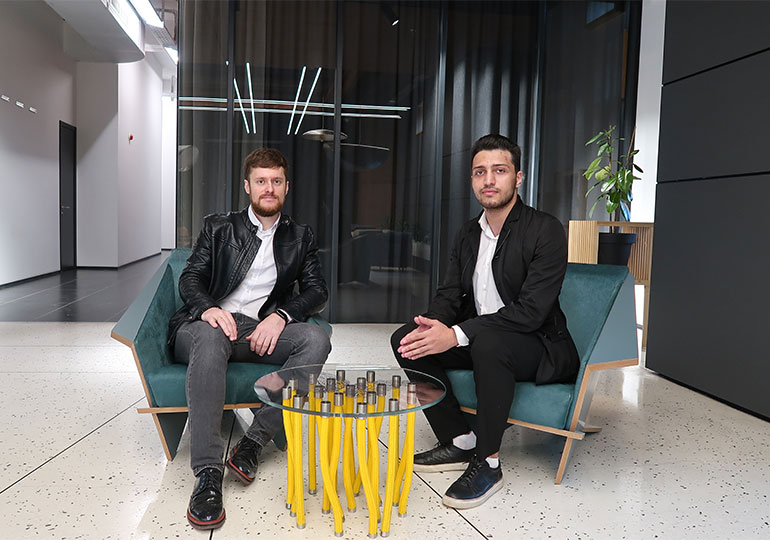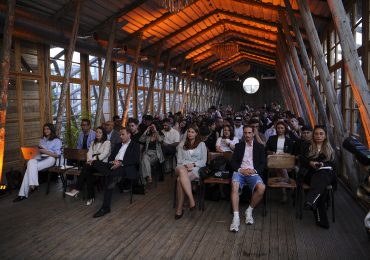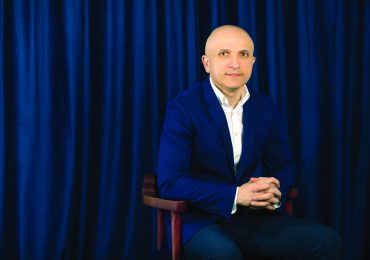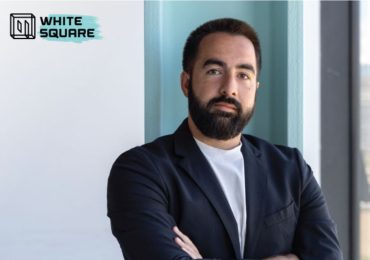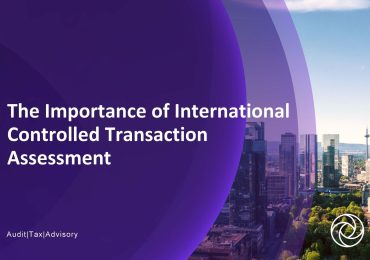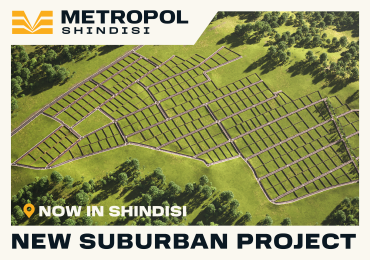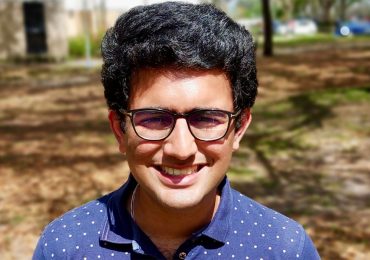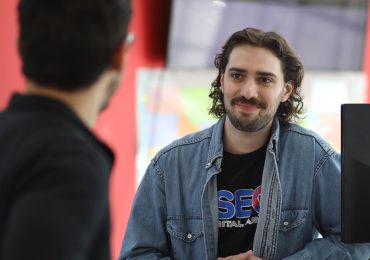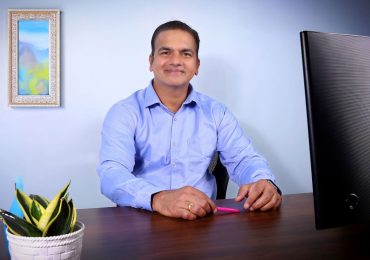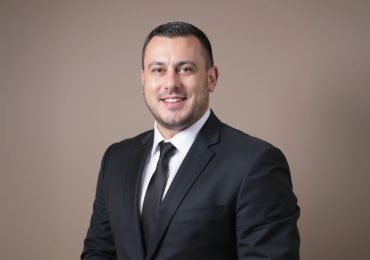Historically, the space industry has always been the playground for huge and wealthy states – with the rise of SpaceX, however, the paradigm has shifted. It’s an enormous industry: engineering, manufacturing and research, medicine, science, communications and popular culture, tourism, law, and even politics – the space industry got it all. It is a growing field, too, envisioned to triple to $1.4 trillion within a decade.
Recently I heard about Altair Enterprises – a company with a very ambitious goal to build a space industry in Georgia and the Caucasus region. I was a bit sceptical, I must say, as the space industry is virtually non-existent in our country. This, however, is said to change quickly, as Altair, as it seems, has a clear and realistic view of the future: they want to focus on space education – a seed from which the industry will burgeon out.
I sat down to talk with co-founders of Altair Enterprises, Martynas Fedotovas and Nick Chinchaladze about their ambitious goal of building the Georgian space industry from scratch, the International Space Convention, and its main theme – space sustainability. What follows is the transcript of our conversation.
Altair Enterprises has a very ambitious mission: “to provide space education, project-based learning, and hands-on experience through research and development on space technologies to make human life multi-planetary”. What services do you provide exactly?
Martynas Fedotovas: We are a space education-oriented company because the space industry, like any other, begins with education. If you think about medicine, architecture, or engineering, it starts with education. That is why we want to cover the fundamental part of the space industry, especially in a region where the presence of the space industry is not so prevalent.
Our main goal is to provide education through different variety of products. The main product that we currently have is the International Space Convention. During the three days of the convention, various speakers will cover a broad, wide spectrum of ideas regarding innovation, technology, education, and research.
At the same time, we have a lot of different projects that we are currently working on. One of the areas we are exploring is the courses that are available on-demand online – including rocket engineering, propulsion systems, satellites, or even the basics. Overall, we give people a different kind of diversified approach in terms of studying and learning about the space industry. Additionally, we provide private consulting for university students and businesses. We believe that there is a huge opportunity in Georgia and the Caucasus region, as there are many companies in the IoT sector that could be retrained and repackaged so that they serve their products to the global space industry market as well.
Altair Enterprises is a company based in Georgia – a country with pretty much non-existent space industry. Are there any financial reasons behind your launch here or it was something else?
M.F.: The reason is very simple – nothing is happening in terms of space. For me, however, the fact that nothing is happening is an opportunity – as far as I know, we are the first ones in this industry. Well, at the same time, if you look more closely at the Caucasus region, let’s say Azerbaijan or Turkey – they have a space industry, space agencies, and space companies that provide services and solutions in software and hardware that are sold to the global market. Well, this is already happening, and these markets are very close – Azerbaijan is just a couple of hours away from Tbilisi. So, the main question is – why this is not the case in Georgia? That is why we want to cover the fundamental piece – education, because we believe that companies and individuals, whatever their goals are in the space industry, don’t necessarily have to be rocket scientists – everybody and anybody could be part of the space industry. We think that is the problem right now in Georgia, as people don’t know that these opportunities exist. So, our job is to put more light on these projects and explain how the space industry works and how individuals and companies can become a part of it.
Your goal is to prepare an educational basis in the region on top of which, in the future, the companies will establish themselves. Correct?
M.F.: Yes, but it goes deeper, too. We cover high school students, university students, and business owners because we need everybody, not only businesses but employees, too.
What are the execution steps that need to be taken in the short- to medium-term in Georgia? What projects are you implementing?
Nick Chinchaladze: As of now, we are covering the Georgian companies that are in the industries adjacent to the space industry – the IoT sector, for example. We are offering private consulting and retraining – we provide them with the know-how, advice, and information, including market analysis and corporate strategy. Most of the time, this means the repackaging of their already existing product or the creation of a completely new product or service for the space industry. We want to help those companies to transition into the space industry or to implement space-related research and development as a part of their strategy.
When you talk about the space industry, what parts of it are you referring to?
M.F.: There are several areas we are looking at, but all the projects and solutions we implement are looked at through the lens of space sustainability – this is the main theme of the International Space Convention. Space sustainability, in part, concerns climate change and CO2 emissions. We need many solutions that will benefit the Earth. A lot of those solutions have been created because of the space travel and space science, and probably a lot of people are not aware of that – one-third of the web cameras that we speak through right now are a spin-off of the space travel laptops and the same goes for the phones, running shoes, CAT scans and even beyond. CAT scans, for instance, were used as a part of the Apollo mission – this technology helped to map the Moon’s terrain to ensure a safe landing.
So our goal is to talk with these individuals and companies and help them understand in a custom way – we speak differently with university students who are just looking to get started and seek information versus the company which is looking to transition into the space industry. The talk is different, right, but all of it must happen through the lens of space sustainability, as there are many problems here on this planet. There are various problems in the LEO, GEO, and MEO levels caused by space debris. Recently, the number of satellites in the atmosphere increased drastically. Those satellites are crucial as they provide downstream data as a service. Yet, the number of satellites creates the space debris problem because this field is unregulated. Here, space law comes into play. It is not science fiction; it is happening as we speak.
As I already mentioned, Azerbaijan and Turkey know that the space industry is needed. The people in this industry are looking at the world differently, so if we create more of these people, they will benefit our countries. We need to inspire these people in Georgia, too, so they can pave the way for the space industry.
Let’s talk about the International Space Convention that Altair is organizing this year in Turkey. What events are you planning to have? Could you drop some names?
N.Ch.: This conference will be a meeting place for the governmental space agencies from different countries – NASA, European Space Agency, and many other space agencies are coming. There will be big publicly traded companies, too. Planet, Maxar, Spire, and D-Orbit are coming. All those high-class CEOs, business owners, researchers, and space lawyers will be coming to discuss the rising trends and recent advances – all under the theme of space sustainability.
There are two main reasons for the International Space Convention. The first reason is to improve the services on the Earth because a lot of the services that the space offers are applied, among others, in maritime, agriculture, and defence. The second reason is to inspire the new generation – that is why this event will be held both offline and online.
Overall, we want to create a space for companies, governmental agencies, and local business owners to meet, discuss the importance of the space industry, and sign deals.
Do you have communication with the Georgian government? How supportive are they?
M.F.: Yes, we have talked to them and received the list of the specific entities that we could work with to communicate the message. We are already working on it: we are doing outreach events with students and entrepreneurs. In terms of direct support, however, it is very hard for them to understand the industry because they must be educated first. Of course, to some degree, these government officials will be present at the IOC in Turkey, where they will have the chance to learn from other politicians and other countries, including how are they developing this industry and how they can try to duplicate and implement the systems and create the infrastructure for the industry to continue to build on its own. Of course, with our support. Then there will be a time when the tipping point will scale. We will see many flourishing companies and start-ups coming up and creating solutions. But it will take some time. Today, we are doing the work necessary to create these opportunities.
The International Space Convention will cover many questions that people might have – it’s a hybrid event with a very heavy schedule, with over forty people talking over three days. All the panel discussions are about different subjects, anything from satellites to space medicine, analogue missions, space research, rocket science, and even beyond. So, there will be everything from researchers discussing their research and how they are conducting it, or how they got a job with an important agency or a company. Another important discussion theme is discussing start-up creation. How would you do it? How would you establish it? Many countries are in a similar situation as Georgia. They are not fortunate in different natural resources and are in the developing phase but have many start-ups and individuals who are finding great solutions and have a great presence in the space industry. We believe that Georgia has a lot to offer. We talk with many university students and individuals and many of them are interested, but they are missing information. Yet, this is exactly what our company is trying to cover.
Let me get back to your mission statement again in which you mentioned multi-planetary life as one of your goals. How feasible is multi-planetary life in practical terms and if it is feasible, what time horizon are we looking at?
N. Ch.: It’s going to take a lot of years. As we are talking right now, NASA plans to go back to the Moon with the Artemis mission. This will be the first return to the Moon since the Apollo missions – it’s been more than sixty years. At the same time, we have private companies like Elon Musk’s SpaceX, which is working towards making human life multi-planetary, but that’s a long-term goal, too. The first Mars mission will be solely to explore and to see what life there is going to be like, because for people to live there, many factors must be accounted for, including the gravity difference, the atmosphere, and radiation. These problems must be solved, but this is only possible by getting there and researching on-site. Right now, going to Mars is quite costly – both in terms of the cost per kilogram and the danger associated with it. But again, talking about this with the current revolution in the space industry, it is safe to assume that these voyages will become more and more affordable as time goes by.
There is an opinion in the scientific community that why don’t we forget about Mars and multi-planetary life for the time being and focus on the preservation of the Earth. What’s your take on it?
M. F.: I agree with that point. I agree because we are not here to tell people that, look, we don’t care about the planet Earth, so let’s go to Mars and even beyond. What we are discussing is inevitable – it is very natural for humankind. How did Spaniards end up on a different continent? Why do we, as humans, like to travel the world? Because we love to explore! This is something natural, something that we have in our genes. We want to see and explore the space because we are a part of it – this is quite natural, especially with the technology that we possess.


